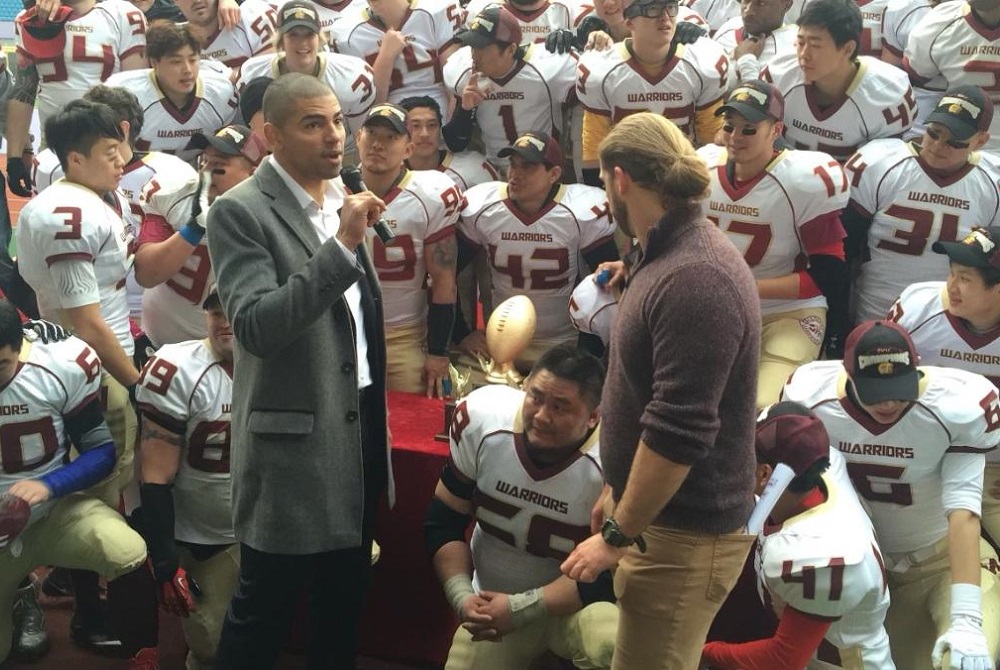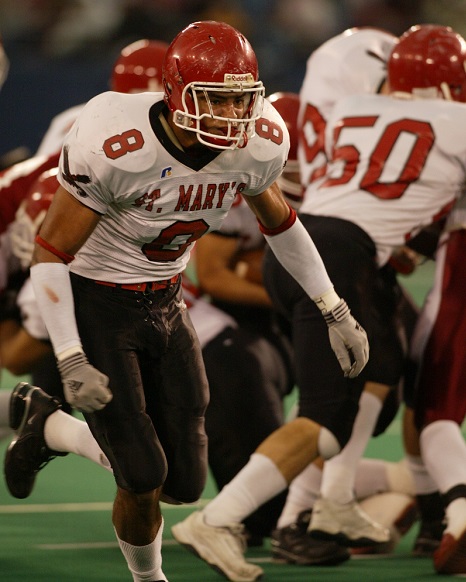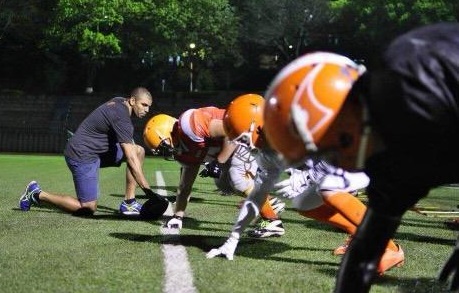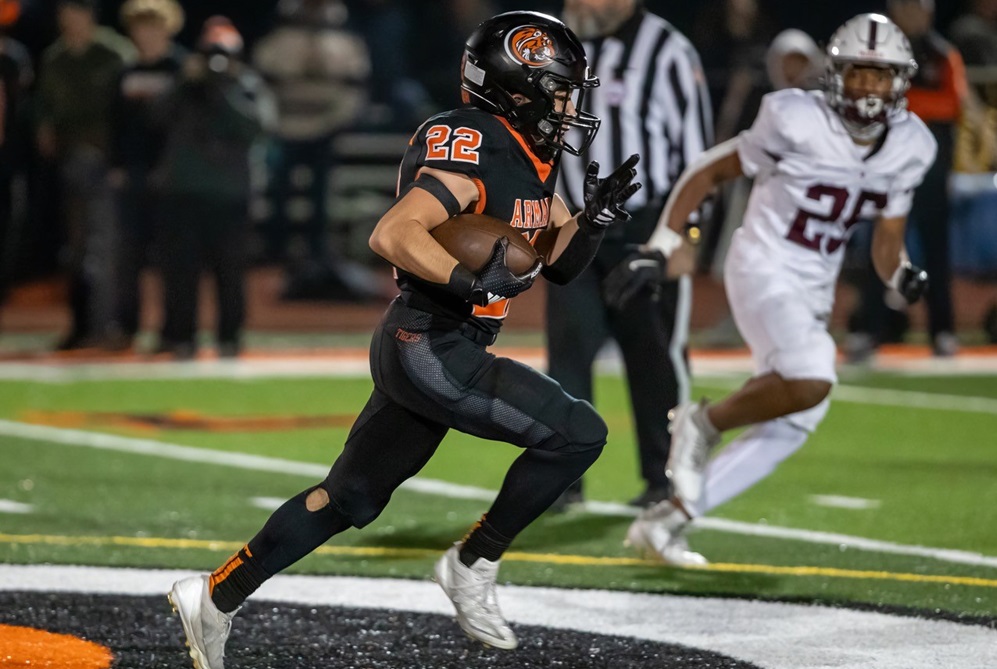
St. Mary's Standout McLaurin Becomes Chinese Football Pioneer
By
Tom Markowski
Special for Second Half
August 19, 2021
The eight years Chris McLaurin spent in China not only changed his life, but they changed the perception of American football in China and elsewhere – and just may have opened the door to a whole new market.
 We're talking “American football,” not soccer. Most of us are familiar with NFL Europe, but NFL China? Not so much.
We're talking “American football,” not soccer. Most of us are familiar with NFL Europe, but NFL China? Not so much.
When McLaurin went to China in 2011, the thought of teaching the locals American football never occurred to him. He went there to work for a private company, and circumstances just seemed to fall in place.
Some might say McLaurin was in the right place at the right time, but it can also be said he was the right person at the right time to lead this undertaking. McLaurin had the background, both athletically and organizationally, to take on such an endeavor.
“I met a lot of people who were interested in football,” McLaurin said. “I thought, football? I had a limited understanding of what they knew. I was very surprised they would reach out to me. I quickly found out they were hungry to learn.”
A 2005 graduate of Orchard Lake St. Mary's, McLaurin started at tight end and linebacker, and helped the Eaglets reach the MHSAA Division 2 Final in 2004 (where they lost to Muskegon). McLaurin went on to play four seasons at Michigan and graduated in 2009 with a degree in history and minor in urban and community studies. He had thoughts of entering law school when other opportunities interceded.
During his time in Ann Arbor, McLaurin worked with an organization that focused on disadvantaged youth in the area and helped open doors for them. They were allowed to attend lectures at the university as well as sporting events.
Upon graduation, the seeds that would blossom in Asia began being sown in other parts of the world.
McLaurin received a Fulbright Scholarship and went to Johannesburg, South Africa, to work with underprivileged youth as part of a program called Tomorrow Trust. During this time he worked with the United Nations Development Programme and Harvard Law School in their pursuit of promoting economic rights for the poor.
Following his work in South Africa, McLaurin began his post-graduate work at the London School of Economics. He earned his degree after working in the House of Commons and as a research assistant for the Runnymede Trust. Then came a six-month internship within the Obama Administration as part of the White House Domestic Policy Council.
And after that, he was off to Chongqing in western China to work for a private equity company as a project manager. Two years later, he started his own company in addition to a non-profit organization. Much of his work centered on the automobile industry and global technology.
During this time he learned to speak Mandarin and, in doing so, was introduced to more of the local customs – including American football.
 What McLaurin found was a rudimental brand of football, what we would term a recreational type of competition. McLaurin began his involvement gradually, on weekends.
What McLaurin found was a rudimental brand of football, what we would term a recreational type of competition. McLaurin began his involvement gradually, on weekends.
“After that first year (2012), I took it up a notch,” McLaurin said. “We started recruiting players and bought new equipment. They watched football on TV, but it's not an easy game to understand. You have to play football to learn it. You don't get that from watching TV.”
A year of training, recruiting and, yes, some frustration, led McLaurin to start a league, the American Football League of China (now known as the China National Football League). The rules are similar to those at the U.S. college level. There are 11 players a side, and when a ball carrier's knee touches the ground the play is over.
In the beginning “it was successful,” he said. “There were no leagues when I got there. There was no one to organize it. We went from (fewer than) 10 teams to, 3-to-4 years later, there are 80-90.”
McLaurin quickly learned he needed help if this adventure was to succeed. USA Football had a footprint in Shanghai, and McLaurin reached out to the organization. McLaurin contacted a handful of former teammates including Prescott Burgess and Morgan Trent for advice. Former NFL player Bruce Plummer and NFL coach and scout Jerry Hardaway worked some of the camps and clinics with McLaurin and added much-needed experience and expertise.
After playing at Southern Illinois, Hardaway’s first coaching position was at Memphis State as an assistant, and then he went to Grambling State to coach under the legendary Eddie Robison for six seasons. He also coached at the University of California under Joe Kapp prior to working in the NFL and then heading to China.
“I was told, through another guy, that (McLaurin) needed some help,” Hardaway said. “It was all about getting back to basics. That's what made it fun. They had no clue when you'd say to them, control the ground at impact when you're making a block. They had no idea of the terms that you'd use. To see the young kids, to see on their faces, they were absorbing everything.
 “Yes, yes, yes, it was worthwhile. First of all, people had no clue about what it takes to do something like this. They were learning. Some of the parents thought it was a violent sport. That's what they heard. Then they switched. They saw me, us, teach the basics and they saw what we were doing. For me, it gave me a sense, like hey, you have to teach and you have to enjoy it.”
“Yes, yes, yes, it was worthwhile. First of all, people had no clue about what it takes to do something like this. They were learning. Some of the parents thought it was a violent sport. That's what they heard. Then they switched. They saw me, us, teach the basics and they saw what we were doing. For me, it gave me a sense, like hey, you have to teach and you have to enjoy it.”
Soon after that first season, the NFL got involved as did the National Committee on United States - China Relations. McLaurin credits the NFL for advising him on the business end of starting a new league and structuring. After 18 months, McLaurin got out of coaching and became the commissioner.
“(The NFL) wanted to expand,” he said. “They saw how their brand was quite low (in China). China is a natural.”
Progress was slow, but it was still progress. The 2015 championship game was played in Shanghai, and McLaurin estimates it drew 3,500 spectators.
He continued to work with the AFLC through 2019 but then decided to make a career move. He returned to the U.S. and, this fall, is pursuing a dream he's held since leaving U-M. At age 34, McLaurin entered Harvard Law School.
“When I started, the last thing we wanted was a U.S. version of football,” he said. “We wanted it to be Chinese football. There were limitations on how many foreigners would compete. At first it was five (per team), then three. We wanted it to be a Chinese experience."
2020-21 Made in Michigan
August 5: Herremans' Focus on 'Dadding,' Giving Kids Similar Small-Town Childhood - Read
July 29: Loy Norrix Career Prepped Crocker for U-M Success, Law Degree Pursuit - Read
July 19: Top PGA Pro Finish Latest Greatest Highlight as Cook Continues Climb - Read
July 16: TC West Standout Renews Ties to Titans, Cheers Past Teammates' Gold Pursuit - Read
July 8: Caro Champs Find Common Ground Again as Mental Health Providers - Read
June 28: Michigan's Minor Leaguers Making Up for Lost Season - Read
PHOTOS: (Top) Former Orchard Lake St. Mary's standout Chris McLaurin started an American football league in China and remained part of its leadership through 2019. (Middle) McLaurin was a two-way starter for St. Mary's 2004 Division 2 runner-up team. (Below) McLaurin runs drills for one of the Chinese teams. (Top and below photos courtesy of Chris McLaurin; middle photo from MHSAA archives.)

1st & Goal: 2024 Playoffs Week 3 Preview
By
Geoff Kimmerly
MHSAA.com senior editor
November 14, 2024
Winter practices have started, and high school hockey teams actually began games this week.
 But for 72 schools across the state, it’s still football season – and they’d like to continue playing as many November games as possible.
But for 72 schools across the state, it’s still football season – and they’d like to continue playing as many November games as possible.
This third week of MHSAA Playoffs features four Semifinals in 8-player – and we switch up the “1st & Goal” format to feature those games first below. We also have 32 11-Player Regional Finals, with winners this weekend needing just one more to book trips to Ford Field.
Games are tonight unless noted. Tickets for 11-Player Regional Finals are $9, and $10 for 8-player Semifinals, and more than 35 of the 36 games to be played will be streamed live on the NFHS Network. Scores and pairings will be updated all weekend at MHSAA.com.
8-Player Division 1
Indian River Inland Lakes (11-0) at Pickford (11-0), 1 p.m. Saturday
This is rematch from a year ago, when Inland Lakes won 12-0 on the way to finishing Division 1 runner-up. The Bulldogs have had only two single-digit games all season, including defeating Alcona 32-26 last week. Senior quarterback Aiden Fenstermaker is leading the march again, running for 1,463 yards and 22 touchdowns and throwing for 831 and 19, respectively. Pickford is seeking to make the Finals for the first time since 2019 and hasn’t played a game closer than 28 points. Senior quarterback Tommy Storey also is a two-way force, running for 1,341 yards and 24 TDs and throwing for 898 and 16 scores.
Mendon (10-1) at Deckerville (11-0), 1 p.m. Saturday
Mendon is just two years removed from playing for the Division 2 title, and avenged its only loss this fall by downing Climax-Scotts to open the playoffs. Junior Owen Gorham has run for 2,114 yards and 42 touchdowns – the rushing TDs already ranking third all-time in MHSAA history – and junior JT Lux follows with 1,160 yards and 14 scores on the ground. Deckerville is playing in its second-straight Semifinal and looking to make its first Final since 2017. The Eagles are averaging 49 points per game and haven’t scored fewer than 30.
8-Player Division 2
Onekama (10-1) at Crystal Falls Forest Park (10-1), Noon Saturday
Forest Park also avenged its lone loss during the playoffs, downing Powers North Central 34-12 last week, and the Trojans also are playing to get back to a championship game for the first time since 2017. Running back Dax Huuki is just a sophomore but leads the rushing attack with 1,267 yards and 18 touchdowns. Onekama won a combined eight games over the past four seasons before bouncing back big to reach the Semifinals for the first time since 2018, when the Portagers finished Division 2 runner-up. Junior quarterback Luke Bradford stands tall at 6-foot-5 and has thrown for 1,175 yards and 11 TDs and run for nine scores. Onekama fell to Marion in Week 2 but defeated the Eagles to open the postseason.
Morrice (10-1) at Britton Deerfield (10-1), 1 p.m. Saturday
Britton Deerfield is another fascinating comeback story, having finished 2-7 a year ago. The Patriots are in their fourth season of 8-player football and playing in their first Semifinal in either format since the school formed from its predecessors in 2011. They’ve run for 4,140 yards this fall, led by senior Luke Wiser with 1,549 with 27 touchdowns. Morrice will play in its third Semifinal over the last six seasons seeking to reach the championship game for the first time since winning Division 1 in 2018. The Orioles too have avenged their lone loss this fall, to Portland St. Patrick, and get it done with a defense giving up only 11.4 points per game and a pair of senior 1,000-yard rushers in Joel Fisher (1,464/18 TDs) and Wyatt Cartier (1,253/24).
11-Player Division 1
Belleville (10-1) at Detroit Catholic Central (11-0)
Even with Belleville’s loss to Howell in Week 9, this has remained one of the most anticipated matchups in the state all season as it’s been assumed these two powers would meet at some point. The last time, Belleville defeated DCC in a 2022 Regional Final, 33-10. After facing seven playoff teams plus an Ohio state title contender, the Shamrocks shouldn’t be daunted by Belleville’s success and star power. But that said, the Tigers are striding coming off their best win this fall, 42-7 last week over Saline.
Other Regional Finals FRIDAY Grand Blanc (9-2) at Rochester Adams (9-2), Detroit Cass Tech (9-2) at Macomb Dakota (10-1). SATURDAY Hudsonville (10-1) at Howell (11-0).
11-Player Division 2
Warren De La Salle Collegiate (8-2) at Birmingham Groves (11-0)
De La Salle has finished at Ford Field seven of the last 10 seasons, and two of the last six years did so after defeating Groves in Semifinals – including 43-15 in 2022. Groves is playing to reach a championship game for the first time, and the Falcons have never been in better position taking on the Pilots after tying their program record for wins last week. Groves hasn’t been challenged in a while, but does have victories over Harper Woods and West Bloomfield this fall. De La Salle is coming off handing Grosse Pointe South its only loss this season and will attempt a repeat performance tonight.
Other Regional Finals FRIDAY Portage Central (8-3) at Byron Center (10-1), Saginaw Heritage (8-3) at East Lansing (8-3), Orchard Lake St. Mary’s (8-3) at Gibraltar Carlson (10-1).
11-Player Division 3
Petoskey (11-0) at DeWitt (11-0)
Petoskey also has set a record for wins this season and will play in a Regional Final for the third time and first since 2014. The Northmen have navigated only two single-digit games this fall and prepped for this run in part with a 41-21 win over Clare in Week 9 – notable as Clare also was a league champion. DeWitt presents arguably their mightiest challenge as the Panthers are undefeated this late for the first time since their Division 3 championship season of 2020 and putting up 55.6 points per game despite a schedule that has three opponents also playing for Regional titles.
Other Regional Finals FRIDAY Grand Rapids Forest Hills Central (9-2) at Zeeland West (10-1), Mason (9-2) at Walled Lake Western (11-0), River Rouge (6-4) at Detroit Martin Luther King (8-3).
11-Player Division 4
Portland (11-0) at Niles (10-1)
For the second-straight season, Portland is undefeated playing Niles for a Regional championship, and last year advanced with a 21-14 win over the Vikings. The Raiders actually have played an identical playoff schedule as 2023 so far, and Niles has enjoyed plenty of familiarity as well with District wins over a pair of regular-season opponents from the Wolverine Conference. The Vikings’ shutout of Edwardsburg last week was their third in four weeks and sixth of the season, providing an intriguing challenge for a Raiders offense almost keeping pace with last year’s scoring at 41.5 points per game.
Other Regional Finals FRIDAY Grand Rapids South Christian (7-4) at Whitehall (8-3), Haslett (8-3) at Goodrich (10-1), Macomb Lutheran North (10-1) at Harper Woods (8-3).
11-Player Division 5
Kalamazoo United (9-2) at Grand Rapids Catholic Central (7-4)
This will be the fourth time United will play for a Regional title over the last seven seasons, and if the Titans are to advance for the first time they’ll have to deal with a GRCC program that has reached Ford Field six of the last eight years. After ending the regular season on a three-game skid but with all three defeats by single digits, the Cougars have impressed in the playoffs including squeaking past Grand Rapids West Catholic 21-18 last week. The Titans have won two rematches to open this postseason and faced playoff teams their last six games, losing only to Jackson Lumen Christi (39-21 in Week 9) along the way.
Other Regional Finals FRIDAY Gladwin (8-3) at Frankenmuth (11-0), Armada (10-1) at Pontiac Notre Dame Prep (9-1), Ann Arbor Father Gabriel Richard (7-4) at Flat Rock (9-2).
11-Player Division 6
Detroit Central (8-3) at Marine City (9-2)
Only three weeks ago, Marine City closed the regular season with a 37-15 win over Central. But as we’ve seen over the first two rounds of the playoffs, rematches can flip quickly, and the Mariners surely won’t be looking past this one as they pursue what would be a first Regional title since 2021. That first matchup arrived with Central coming off a close win over Detroit Denby for a Detroit Public School League City championship, and since that defeat the Trailblazers have won their playoff games by a combined 69-24. Marine City has picked up momentum as well, especially with last week’s 38-28 win over Warren Michigan Collegiate.
Other Regional Finals FRIDAY Boyne City (9-2) at Reed City (9-2). SATURDAY Lansing Catholic (8-3) at Newaygo (9-2), Constantine (8-3) at Jackson Lumen Christi (10-1).
11-Player Division 7
Schoolcraft (10-1) at Hudson (10-1)
The eight teams remaining in Division 7 have a combined seven losses, making all four matchups among the most intriguing as a group. These two are meeting for the first time since facing off in a 2001 Division 6 Semifinal, Hudson on a 10-game winning streak this season and Schoolcraft losing only in Week 3 by two points to Division 6 Constantine. Defense may dominate; the Eagles are giving up 9.9 points per game and just shut out a Lawton offense that averaged 35, while Hudson is giving up 8.4 ppg and hasn’t allowed more than seven since the first weekend in October.
Other Regional Finals FRIDAY Leslie (10-1) at Monroe St. Mary Catholic Central (11-0). SATURDAY North Muskegon (10-1) at Menominee (10-1), Pewamo-Westphalia (9-2) at Millington (10-0).
11-Player Division 8
Harbor Beach (11-0) at Fowler (11-0), Saturday
While featuring two of the state’s smallest 11-player schools, this might draw an above-proportion amount of attention as one of only two matchups of undefeated contenders in any 11-player bracket. Harbor Beach is seeking its first Regional title since 2018, and Fowler its first since 2019. Fowler finished the regular season third in Division 8 playoff-point average, and Harbor Beach downed top-ranked Clarkston Everest Collegiate 37-7 last week. The Eagles’ best three wins were against Division 7 teams, including two still playing.
Other Regional Finals FRIDAY Detroit Loyola (5-6) at Riverview Gabriel Richard (9-1). SATURDAY Beal City (9-2) at Iron Mountain (11-0), Reading (7-4) at Decatur (10-1).
MHSAA.com's weekly “1st & Goal” previews and reviews are powered by MI Student Aid, a division within the Department of Lifelong Education, Advancement, and Potential (MiLEAP). MI Student Aid encourages students to pursue postsecondary education by providing access to student financial resources and information. MI Student Aid administers the state’s scholarship and grant programs that help make college Accessible, Affordable and Attainable for you. Click to connect with MI Student Aid and find more information on Facebook and Twitter @mistudentaid.
PHOTO Armada’s Jackson Malburg breaks into the open during last week’s District Final win over Hazel Park. (Photo by Adam Sheehan Photography.)

